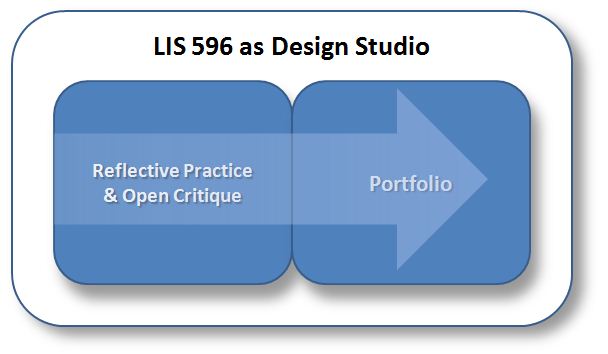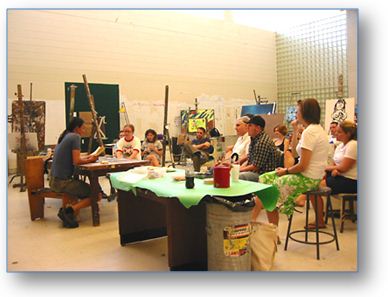Course Overview
Description & Purpose •
Objectives •
Expectations
Format •
Technology • Academic Conduct
Course Description & Purpose
«Course Overview [13 slides ( 00:37:50 )]»
«Download Lecture PowerPoint»
Please accept my applolgies, but the timeframe between Spring and Summer quarters has been too short for me to re-record this lecture with changes made necessary by the shorter Summer Quarter class schedule. As opposed to 10 full weeks, we have just under 9 weeks this summer. So, the schedule discussed in the lecture is just a bit off. I have made corrections in the schedule everywhere on this website (I think!) but in this lecture.
LIS 596: Professional Portfolio, like all of the other available (or soon to be available) MLIS culminating experiences, assumes the necessary professional background to successfully "culminate" the degree program. Unlike the culminating experiences that focus on research (i.e., INFX 594: Research Project and LIS 700 Master's Thesis), LIS 596: Professional Portfolio focuses on the design (and design processes) of a digital professional portfolio for full or limited publication. In this sense, the course shares a design focus with INFX 595-596: Capstone. Successful completion of LIS 596 hinges on the following:
- You are prepared for the work in developing a portfolio by gathering a set of artifacts evidencing professional-level work prior to the start of class that stems from course work, previous and current employment, directed field work, service contributions, and other relevant sources.
- You are willing and prepared to work with a high level of personal autonomy befitting a nascent professional while actively engaging in the processes of open peer critique in small peer groups and on the class forums. Thus, your success is contingent on your willingness and ability to engage in the constructive critque of the portfolio work of your peers and to receive and respond to constructive critique of your own portfolio work.

Since LIS 596 is a design experience, the course is run as a design studio in the sense that work is critiqued in the "open" through the sharing of your work with peers and the course facilitators. The courses is not based on traditional graded deliverables developed by the student for sole assessment by the instructor. Instead, at the close of each of the three course milestones, the facilitators will inform each student as to whether adequate progress toward credit has been achieved. With the exception of the final portfolio submission, all milestone deliverables will be part of the critique process by peers and facilitators. Only facilitators will formally critique the final presentation portfolio submission. Since student development hinges as much on constructive critique by peers as by course facilitators, students will be given the opportunity at the end of the class to assess the contributions of their peer group colleagues to their development.
 What is a "design studio"?
What is a "design studio"?
The activity of developing a portfolio is a design activity just as creation of a new information system or service, design of a new thesaurus, or development of an adult reading program are all design activities. Design studio is a method developed through design education and apprenticeship in fields such as theatre arts, information system design, painting, and architecture, where students develop knowledge and skills through "doing" and through respectful criticism of all work as a community of designers.
LIS 596 builds on the processes for professional development stemming from the architecture and fine arts design studios.
Therefore, you will: (1) design the portfolio "in the open"; and (2) engage in both structured and unstructured open critiquing activities in which we share the results of our efforts with our peers and grow as a result of their constructive criticism.
One outcome of the course is the presentation portfolio presenting your's professional goals, achievements, knowledge and skills, experience and professional objectives. A second outcome of the course is a process for developing as reflective practitioners and planning for future professional development.
Objectives
At the end of this course students will have demonstrate their ability to:- Engage in an ongoing process for determining personal professional accomplishments and qualifications in terms of both professional practice standards and the requirements of a desired professional practice niche;
- Reflective on practice outcomes (artifacts) and processes (experiences) as a means of developing as an autonomous, qualified and self-directed professional;
- Develop an ongoing process for critical analysis of gaps in needed professional knowledge, skills, and habits of mind as a means of:
- refining practice by noticing what one is doing wrong (or that could be done more effectively) and trying different strategies to do better; and
- developing a continuing education (CE) strategy by exploring real world options for specific CE experiences;
- Begin developing critical skills in peer critique in order to: (a) better assess the levels of a peer's professional accomplishments; and (b) engage in the processes of respectful and honest critique with the intention to serve usefully in that peer's professional development.
- Better articulate the relevance of their professional knowledge and skills as well as their intentions toward continuing professional development.
- Identify learning and professional goals that provide the means for personal assessment;
- Identify the assessment context of the professional portfolio, including its purpose;
- Select and reflect on experiences and artifacts for the ongoing development of a working portfolio;
- Identify the audience and context for a particular presentation portfolio;
- Develop and implement a self-guided program of professional development; and
- Assess personal professional development against personal goals and the expectations of the field.
Expectations for this Course
At the conclusion of the course, we expect every student to have prepared a portfolio for presentation that presents the students professional accomplishments in a manner that reflects the highest levels of expectations for an entry-level professional. To achieve that goal, students are expected to engage actively both in the creation of their own portfolio components including artifacts evidencing profession-level experiences accompanied by meaningful reflections on those artifacts and in the processes of peer review and critique of the work of fellow students. Students are expected: (1) to engage in thoughtful assessment of the 'gaps' in their professional education to be addressed in the short-term through professional development; and (2) to develop a long-term strategy for lifelong professional learning.
From the facilitators of the course, students can expect prompt and thoughtful responses to all communications directed to them and constructive assessment of student work through meaningful feedback.
Course Format
LIS 596 Professional Portfolio is taught only online. Milestones 1 and 2 involve working in critiquing groups. Online forums have been set up here in the class online environment to support these critiquing groups. Broader course discussions will take place solely online through discussion forums established for specific purposes. For more detailed information regarding specific discussion forums, see the Course Communications link in the left-hand navigation bar.
The critiquing groups will have no more than 4 student participants. Critique group membership will be determined by the students themselves up to the first day of instruction. Students that have not joined a group by the first day of instruction will be assigned to a group by the course facilitators. In these two critiquing assignments, each participant will be responsible for the submission of a work assignment relating to their portfolio and the constructive, written critique of the portfolio work of their group colleagues.
Technology and Software Requirements
For this class you are expected to have:
- access to a PC computer that runs Windows XP Home or Professional;
- at minimum, a 56K connection to the Internet;
- a system that includes a sound card, speakers, microphone, and CD-ROM drive;
- the most current version of Internet Explorer, Mozilla Firefox or Netscape Navigator;
- the most current version of Adobe’s Macromedia Flash Player
- the most current version of Windows Media Player; and
- the ability to install and configure software on a computer.
Academic Conduct
The following paragraphs discussing academic integrity, copyright and privacy outline matters governing student conduct in the iSchool and the University of Washington. They apply to all assignments and communications in this course.
Academic Integrity
The essence of academic life revolves around respect not only for the ideas of others, but also their rights to those ideas and their promulgation. It is therefore essential that all of us engaged in the life of the mind take the utmost care that the ideas and expressions of ideas of other people always be appropriately handled, and, where necessary, cited. For writing assignments, when ideas or materials of others are used, they must be cited. The format is not that important–as long as the source material can be located and the citation verified, it’s OK. What is important is that the material be cited. In any situation, if you have a question, please feel free to ask. Such attention to ideas and acknowledgment of their sources is central not only to academic life, but life in general.
Please acquaint yourself with the University of Washington's resources on academic honesty.
Copyright
All of the expressions of ideas in this class that are fixed in any tangible medium such as digital and physical documents are protected by copyright law as embodied in title 17 of the United States Code. These expressions include the work product of both: (1) your student colleagues (e.g., any assignments published here in the course environment or statements committed to text in a discussion forum); and, (2) your instructors (e.g., the syllabus, assignments, reading lists, and lectures). Within the constraints of "fair use" (you should have/will have learned about that in depth in LIS 550), you may copy these copyrighted expressions for your personal intellectual use in support of your education here in the iSchool. Such fair use by you does not include further distribution by any means of copying, performance or presentation beyond the circle of your close acquaintances, student colleagues in this class and your family. If you have any questions regarding whether a use to which you wish to put one of these expressions violates the creator's copyright interests, please feel free to ask the instructor for guidance.
Grading
See the Grading section on the Assignments page.
Privacy
To support an academic environment of rigorous discussion and open expression of personal thoughts and feelings, we, as members of the academic community, must be committed to the inviolate right of privacy of our student and instructor colleagues. As a result, we must forego sharing personally identifiable information about any member of our community including information about the ideas they express, their families, life styles and their political and social affiliations. If you have any questions regarding whether a disclosure you wish to make regarding anyone in this course or in the iSchool community violates that person's privacy interests, please feel free to ask the instructor for guidance.
Knowing violations of these principles of academic conduct, privacy or copyright may result in University disciplinary action under the Student Code of Conduct.
Students with Disabilities
To request academic accommodations due to a disability, please contact Disabled Student Services: 448 Schmitz, 206-543-8924 (V/TTY). If you have a letter from DSS indicating that you have a disability which requires academic accommodations, please present the letter to me so we can discuss the accommodations you might need in the class.
Academic accommodations due to disability will not be made unless the student has a letter from DSS specifying the type and nature of accommodations needed.
Student Code of Conduct
Good student conduct is important for maintaining a healthy course environment. Please familiarize yourself with the University of Washington's Student Code of Conduct.
Home •
Course Overview •
Calendar & Modules
Assignments & Grading •
Readings • Course Communications
Instructor Information •
Student Directory
Last updated: Thursday, 31-Mar-2011 09:24:54 PDT
© 2006 Information School of the University of Washington
All rights reserved

